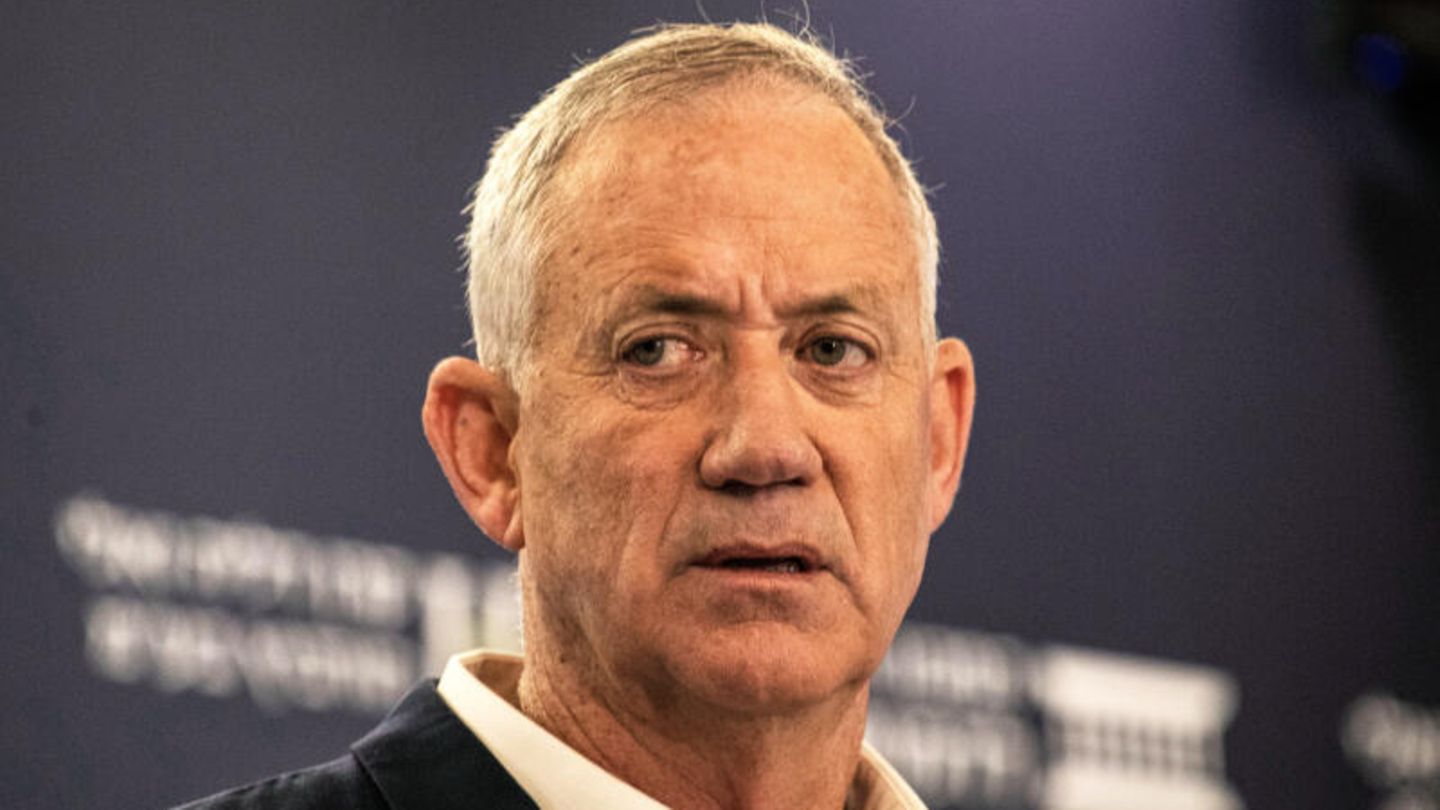Minister Benny Gantz has announced that he will resign from President Benjamin Netanyahu’s Israeli war cabinet. The 65-year-old had threatened to resign several times in recent weeks.
Due to differences of opinion over the future of the Gaza Strip, Minister Benny Gantz is leaving the emergency government formed in Israel after the terrorist attack by the Islamist Hamas on October 7. Gantz announced this to journalists on Sunday evening. The 65-year-old former defense minister had already threatened to take the step if Prime Minister Benjamin Netanyahu’s government did not develop a plan for a post-war order in the Gaza Strip.
The ultimatum that Gantz gave Netanyahu a few weeks ago expired on Saturday. However, due to the dramatic release of four hostages from the Gaza Strip, he postponed a planned press conference at the last minute. According to Gantz, the withdrawal from the Netanyahu-led government also affects other members of his National Union party.
Israel: Gantz announces resignation from war cabinet – majority still with Netanyahu
But he will not topple Israel’s leadership with this step. Even without Gantz’s party, Netanyahu’s right-wing religious cabinet still has a majority of 64 of 120 seats in parliament. The former general Gantz joined Netanyahu’s government as a minister without portfolio after the unprecedented attack by Hamas and other terrorist groups on October 7 in order to send a signal of unity. The centrist National Union party led by Gantz is in the opposition.
Netanyahu also formed a war cabinet with Defense Minister Joav Galant, Gantz and two non-voting members. The influence of Netanyahu’s ultra-right coalition members in deciding the most important war decisions was thus limited. Gantz’s move could reportedly lead to the dissolution of the war cabinet.
Netanyahu had urged Gantz on Saturday evening not to leave. “Do not leave the emergency government. Do not give up unity,” he wrote to Gantz on Platform X. “This is the time for unity, not division. We must remain united among ourselves in the face of the great tasks that lie ahead.”
Gantz criticized Israel’s actions in Gaza
The Times of Israel wrote that without Gantz’s support, Netanyahu would be even more vulnerable to the demands of his right-wing coalition partners, who are calling for even tougher action against Hamas in the Gaza Strip. The paper speculated that Israel’s leadership could lose international support even faster. Gantz had given the most right-wing government in Israel’s history a somewhat moderate reputation as a “responsible adult.”
According to media reports, the US wanted Gantz to remain in the cabinet as long as negotiations on an agreement for a ceasefire and the release of hostages with Hamas continued. Since Netanyahu’s right-wing coalition partners are against a deal, Gantz’s presence in the emergency government is of great importance for the success of an agreement.
War in the Middle East
People on the run, Israel’s flag on the tank: the invasion of Rafah in pictures
Former Chief of Staff Gantz recently complained that important leadership decisions to secure victory in the Gaza Strip had not been made. “A small minority has taken over the command bridge of the Israeli ship of state and is steering it towards the cliffs,” said Gantz, referring to Netanyahu’s right-wing extremist coalition partners.
Among other things, Gantz called for the establishment of an American-European-Arab-Palestinian alternative government in the Gaza Strip. This could not be Hamas or Palestinian President Mahmoud Abbas, he said. The USA, on the other hand, is relying on the Palestinian Authority (PA), which governs the West Bank and is led by Abbas, for the post-war period. The PA is to be restructured according to Washington’s wishes and then take back control of the Gaza Strip. Netanyahu rejects this. Hamas forcibly expelled the PA from the Gaza Strip in 2007.
Media reports: Gantz’s withdrawal could also be linked to declining popularity
There have also been recent complaints from the army that, due to the lack of a political strategy for the post-war period, soldiers are repeatedly having to fight in places in the Gaza Strip from which the military had actually already withdrawn.
However, Netanyahu has so far refused to present a plan for the administration and reconstruction of the Gaza Strip after the war, probably in order not to offend his ultra-right coalition partners. They are pursuing goals such as the highly controversial construction of Israeli settlements in the Gaza Strip. But Netanyahu’s political survival depends on them.
The media speculated that Gantz’s return to the opposition could be due to his declining popularity. For many months, his party had been far ahead of Netanyahu’s Likud party in opinion polls. However, according to some polls, for the first time since the war began around eight months ago, a narrow majority would prefer Netanyahu to Gantz for the office of prime minister. His party’s lead over Netanyahu has also shrunk recently.
Source: Stern
I have been working in the news industry for over 6 years, first as a reporter and now as an editor. I have covered politics extensively, and my work has appeared in major newspapers and online news outlets around the world. In addition to my writing, I also contribute regularly to 24 Hours World.




